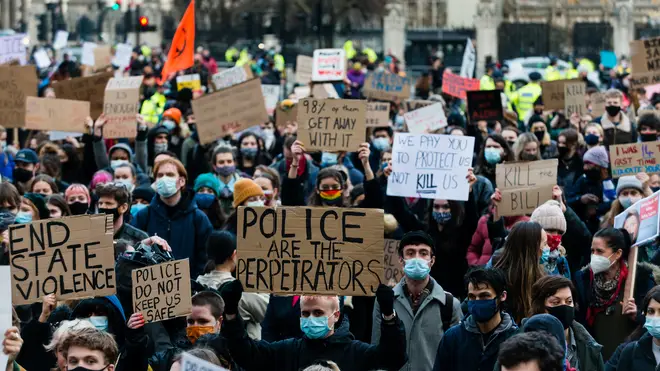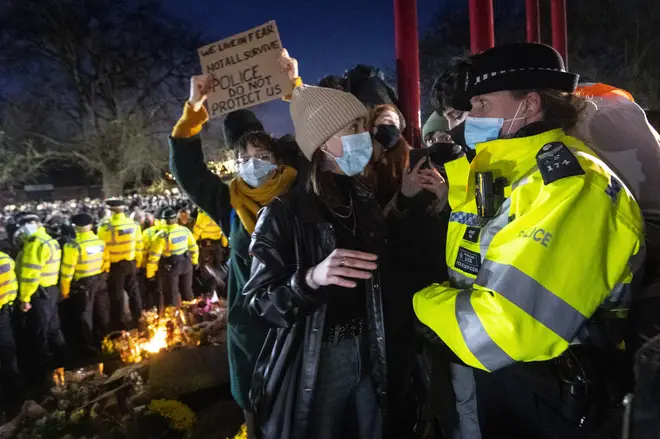
Ben Kentish 7am - 10am
16 March 2021, 16:51 | Updated: 17 March 2021, 05:40

Protests will be legally allowed under Covid-19 rules from March 29, Downing Street has said, as the Government faces opposition over proposed legislation which would curb demonstrations.
On Saturday crowds gathered on Clapham Common in south London to remember 33-year-old Sarah Everard who went missing while walking home from a friend's flat on March 3, but ugly scenes broke out as Metropolitan Police officers clashed with them.
Serving Metropolitan Police officer Wayne Couzens, 48, has been charged with Sarah's kidnapping and murder.
The gathering was originally planned to be a socially-distanced one with the assistance of police, but after the force pulled support and told people not to attend due to coronavirus rules, people went to pay their respects anyway.
Read more: Priti Patel urged to 'decriminalise protest' after Sarah Everard vigil
The Prime Minister's official spokesman told reporters: "The stay-at-home order will lift on March 29, which means it is no longer illegal to leave your home save for the exemptions which we are all aware of.

"In line with that, as you saw under Tiers 1-3 previously, protests will also be able to resume from March 29, however these will still be subject to the previous Covid-secure precautions we had, namely that organisers need to submit risk assessments and ensure there is appropriate social distancing."
Meanwhile Justice Secretary Robert Buckland has insisted he does "not see what the fuss is about" over controversial new powers to curb protests.
He told MPs he has no second thoughts over the new measures contained in the Police, Crime, Sentencing and Courts Bill, and accused Labour of seeking to create a distraction from its own difficulties.
Read more: PM backs Met chief amid outrage over policing of Sarah Everard vigil
Read more: British public supports Cressida Dick amid fallout from Sarah Everard vigil, poll finds
It came as shadow justice secretary David Lammy warned Mr Buckland not to get "annoyed" at the despatch box, as under his Bill that is "something that you can go to prison for".
The Police, Crime, Sentencing and Courts Bill would give police in England and Wales the power to impose conditions on non-violent protests judged to be too noisy and thereby causing "intimidation or harassment" or "serious unease, alarm or distress" to the public.

Solicitor explains why rape prosecutions are at all time low
Asked by the SNP's Stuart McDonald (Cumbernauld, Kilsyth and Kirkintilloch East) to act on concerns raised about the Bill, Mr Buckland told the Commons: "No, I do not have any second thoughts.
"The particular provisions on protest are a reflection of the Law Commission's report of 2015 and indeed a reflection of the common law in England and Wales on public nuisance, which refers to - amongst other things - annoyance, serious annoyance and other terms which are well known to law.
"The maximum penalty in common law for public nuisance was life imprisonment and that's being reduced to 10 years. I really frankly do not see what the fuss is about, I rather think it is a confection designed to assist an Opposition in difficulty."
Meanwhile, Mr Lammy questioned why rape convictions have fallen to an all-time low under the Justice Secretary's watch.
He told the Commons during justice departmental questions: "A study by the UN Women UK showed that 97% of young adult women in the UK have experienced sexual harassment in public places.
"One in five women will suffer sexual assault in their lifetimes, under his watch rape convictions have fallen to an all-time low at just 1.4%.
"What does the Lord Chancellor have to say to the 96% of abuse victims who feel it is no longer worth making a complaint?
"What does he have to say to the 45% who said complaining would make no difference? What does he have to say to all women who have suffered abuse and have given up hope of this Government's ability to deliver justice?"
Mr Buckland replied: "Well (Mr Lammy) is right to raise the worrying statistics about the gap that exists between the system and the confidence of women in particular who feel the system does not work for them."
He added that the Government "has pioneered important legislation" to improve the system for women.
The Justice Secretary continued: "We are able in the Bill that we are debating today to go even further to impose longer sentences for those who commit crimes predominantly against women and girls.
"(David Lammy) and his party have an opportunity tonight to help the very women that he talks about, but they choose to vote against, to not support the Government in their fight against crime and in their support for victims such as women and girls."
Asking his second question, Mr Lammy said: "(Mr Buckland) has got to watch it, (the) Secretary of State, because I think he is getting annoyed and he's of course made that something that you can go to prison for in the Bill that we are voting on a bit later."
Mr Buckland replied: "I think I am entitled to be more than a little annoyed by the refusal of the Opposition to come together to work to achieve a better society for women and girls - no, they have chosen the path of party politicking and in an attempt to cover the deep divisions that exist on this side, they are politicising an issue that should rise above politics.
"I am deeply disappointed and yes I am annoyed on behalf of the thousands of women and girls who see this as an opportunity for change.
"He is rejecting that, he is voting against tougher sentences, he will have to answer to his constituents and the country."